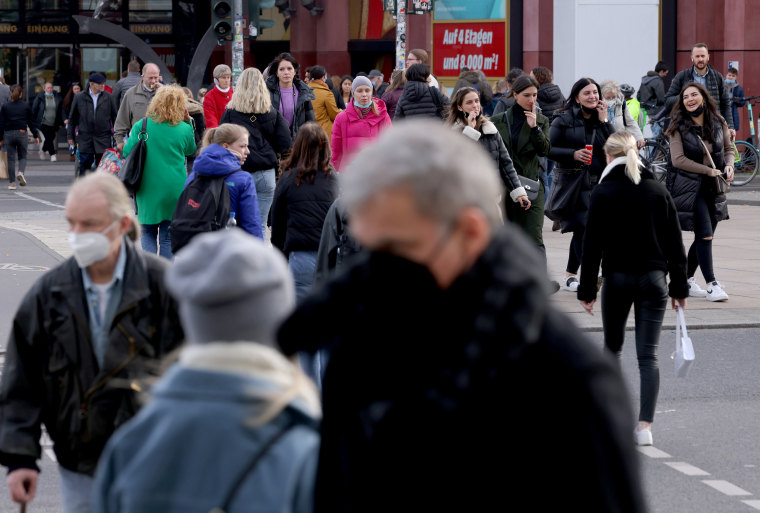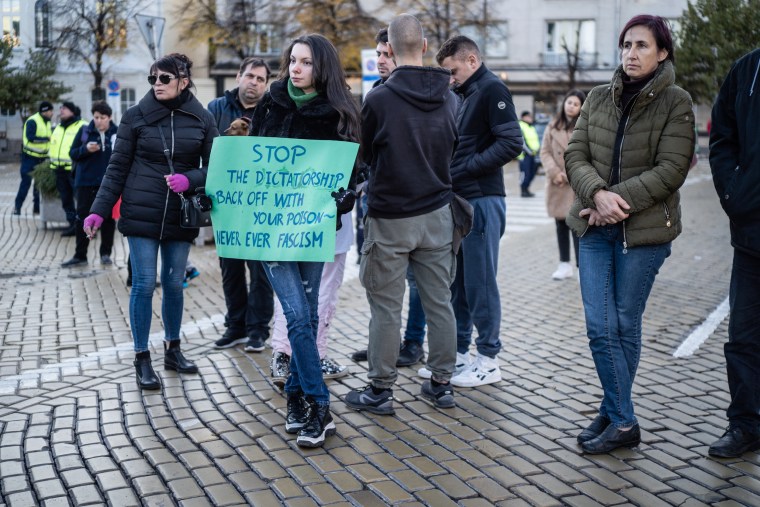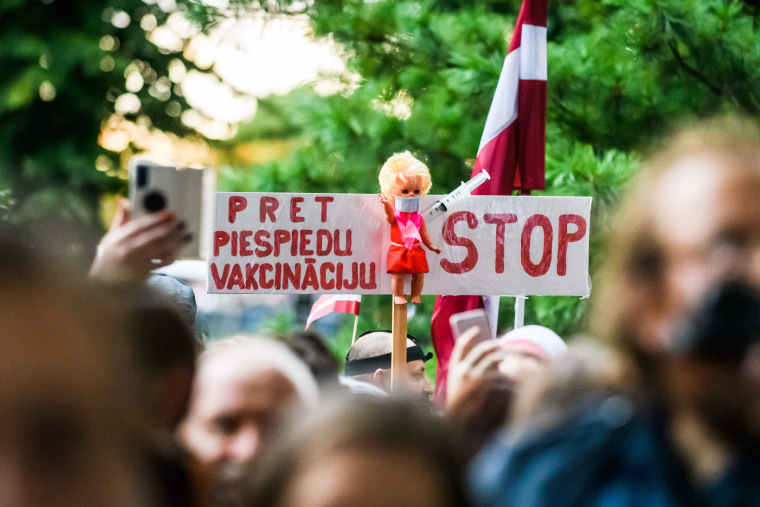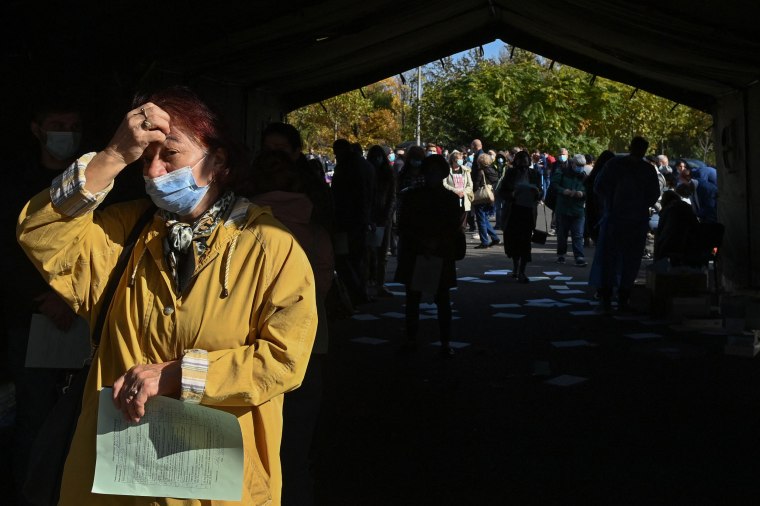As Europe finds itself at the center of the Covid-19 pandemic once again, experts say it should serve as a warning to the U.S. and other countries about the coronavirus’s unremitting nature.
Case numbers have soared across the continent — more than 50 percent last month — and the worrying trend has continued this month as winter begins to bite.
Dr. Hans Kluge, the director of the World Health Organization’s Europe region, warned Nov. 4 that the region was "back at the epicenter of the pandemic," and his words proved prescient.
The WHO said Friday that nearly 2 million cases were reported across Europe in the previous week — the most the region has had in a single week since the pandemic began.
In recent weeks, Germany reported record daily numbers of new infections, with more than 50,000, according to data from Johns Hopkins University.
The Netherlands also reported more than 16,000 cases — the country’s most since the pandemic began — prompting the government to begin a partial lockdown Saturday that is set to last at least three weeks.
As case numbers surged toward the end of last month, Belgium reimposed some Covid restrictions, including a requirement to wear masks in public places. People also have to show the country’s Covid-19 pass to enter bars, restaurants and fitness clubs. The passport shows that they have been fully vaccinated, have had recent negative tests or have recently recovered from the disease.
The country nonetheless recorded more than 15,000 daily cases last Monday.
Despite the surge, daily death rates in all three countries have remained relatively stable compared with past spikes, and experts have credited high vaccine uptake for weakening the link between the numbers of cases and hospitalizations and deaths.
Download the NBC News app for breaking news and politics
"Luckily, the high vaccination coverage limits the death toll and hospitalizations there to a large extent," Tom Wenseleers, an evolutionary biologist and biostatistician at KU Leuven, a university in Belgium, said Wednesday in an email.
Belgium, which reported hundreds of deaths at the start of the pandemic and then again last autumn, when a second wave of cases forced a national lockdown, has had its "hospital capacity tested" in recent weeks, Wenseleers said. But overall deaths appear largely to have been decoupled from high case rates, he said.
'Truly disastrous'
However, the same cannot be said for Eastern Europe, where, he said, the situation is "truly disastrous."
Over the last three weeks, Romania, with 591; Bulgaria, with 334; and Latvia, with 64, have reported record daily death numbers, according to Johns Hopkins data. Case numbers have also surged.

Saying the surge was "worrying," Wenseleers said he believed low vaccine uptake and high vaccine hesitancy were largely to blame.
"It’s not due to lack of vaccines," he said, noting that the joint procurement of vaccines at the European Union level meant all 27 member states "were able to buy equivalent quantities of vaccines."
"Despite having access to vaccines, those countries did not manage to convince their population to get vaccinated," he said.
At least 1 in 3 people in countries in eastern Europe do not trust the health care system, compared to an average of 18 percent across the EU, a European Commission poll known as the Eurobarometer found, Reuters reported.
Romania and Bulgaria are among the countries with the lowest rates of vaccine uptake across the continent, according to the EU’s vaccination tracker.
The latest data showed that less than 23 percent of the adult population in Bulgaria had been fully vaccinated, while just over 25 percent had had at least one shot. In Romania, just under 34 percent of the population above age 18 had been fully vaccinated, while almost 38 percent had had at least one dose.

The Eurobarometer poll showed that respondents in both countries were among the least likely to express enthusiasm for getting vaccinated.
The vaccination tracker also showed that other Eastern European countries have low vaccination rates compared to their Western neighbors.
That "means that high case rates there translate [into] a very high death toll," Wenseleers said.
Danny Altmann, a professor of immunology at Imperial College London, said that as the first winter with the delta variant approaches, he was "not sure if people in Eastern Europe appreciate how punishing the pandemic continues to be in the time of delta."

"It’s unremitting," he said. With some Eastern European countries "at the extreme end of vaccine hesitancy," he added, "there’s no possibility of dealing with this pandemic under these conditions."
In Austria, which has long been a bridge between east and west, the government ordered a nationwide lockdown for unvaccinated people Sunday to slow the fast spread of the coronavirus.
The move means unvaccinated people older than 12 will be banned from leaving their homes from midnight Sunday, except for basic activities like working, food shopping, going for walks — or getting their shots.
“It’s our job as the government of Austria to protect the people," Chancellor Alexander Schallenberg told reporters Sunday in Vienna. “Therefore we decided that starting Monday ... there will be a lockdown for the unvaccinated.”
Epidemiologist Eric Feigl-Ding, a senior fellow at the Federation of American Scientists, said the high death rates should be “a warning” for other countries with low vaccination rates.
While he said he believed the most effective approach is multipronged, including coronavirus measures like mask-wearing and social distancing, he said vaccines and booster shots are critical to prevent the spread of Covid-19.
Wenseleers agreed, saying people in the U.S. should take heed of the situation unfolding across Europe.

U.S. states both with high and low vaccination rates could take Europe’s case numbers as "a sign that the U.S. might still see resurgences, as well," he said.
On both sides of the Atlantic, "convincing as many people to get vaccinated should be the top priority," along with "setting up booster campaigns" for those most at risk, he said.
